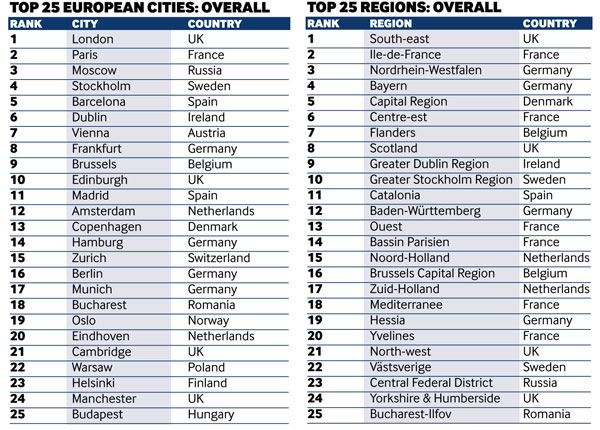London has once again been crowned fDiMagazine’s European City of the Future, with Paris and Moscow following in second and third places, respectively. In the 2010/11 benchmark, London performed well across the spectrum, achieving the top position in the categories of economic potential, human resources and infrastructure, as well as claiming second position for FDI Strategy. London’s domination in the competition is unsurprising given the city has attracted more than one-third more FDI projects over the past five years than any other European city, according to fDiMarkets.
Among the top 25 European Cities of the Future, the UK and Germany dominated, accounting for one-third of the cities. Bucharest, Warsaw and Budapest also put in an appearance in the top 25, ranking 18th, 22nd and 25th, respectively.
Advertisement
London triumphed in most categories of the Major Cities group, though Bucharest claimed the title of the Best Major European City for Cost Effectiveness and Vienna was awarded the Best Major City for Quality of Life. fDiMagazine’s independent judging panel was particularly impressed by Hamburg’s FDI strategy, ranking it as the Best Major City for FDI Strategy, closely followed by London, Berlin, Stockholm and Madrid.
fDiMagazine’s European Cities and Regions of the Future 2010/11 shortlists, which took more than six months to research and involved the collection of data for 223 cities and 142 regions in Europe, ranked Frankfurt as the Best Large City of the Future, with Amsterdam and Oslo ranking second and third, respectively. Leipzig in Germany out-ranked Glasgow (second) and Valencia (third) to claim the title of the Best Large City for FDI Strategy.
Edinburgh was crowned the Best Small City of the Future 2010/11, as well as achieving the best position of any small city in the overall rankings – at 10th position overall. Cities from the UK monopolised the FDI Strategy category in the Small Cities group, with Leeds, Edinburgh and Manchester taking second, fourth and fifth positions, respectively, yet all were beaten by Antwerp, which was awarded Best Small City for FDI Strategy.
The Micro European City of the Future 2010/11 award went to Eindhoven in the Netherlands, primarily due to its high positions in the categories of economic potential and business friendliness. In the same category, Reading in the UK claimed Best Micro City for Infrastructure, while Monaco achieved Best Micro City for Quality of Life.
The UK’s South-east was awarded fDiMagazine’s European Region of the Future 2010/11, followed closely by Ile-de-France and Nordrhein-Westfalen in Germany, with only one percentage point separating the top two regions. fDiMagazine’s independent judging panel recognised Flanders as the Best European Region for FDI Strategy.
The UK’s South-east also claimed the award for the Best Northern European Region of the Future, followed by the Capital Region of Denmark and Scotland, in second and third places, respectively. The Best FDI Strategy in Northern Europe category was dominated by UK regions, with Yorkshire and Humberside ranking second, followed by Scotland and Thames Valley ranking third and fourth, respectively.
Advertisement
Polish regions accounted for half of the top 10 Eastern European Regions of the Future; however, the Bucharest and Prague regions claimed the top two positions. The Northern Great Plain of Hungary was awarded the Best European Region in Eastern Europe for FDI Strategy, followed by Lesser Poland.
In Southern Europe, Catalonia ranked top for Best Region of the Future, followed closely by Madrid, which was top for Best FDI Strategy in the Southern Europe region. The independent judging panel regarded other Spanish regions such as Catalonia, Andalucia, Navarra, Aragon and Castilla-la Mancha as having an impressive FDI Strategy and so all were included in the top 10 for Best FDI Strategy in Southern Europe.
Ile-de-France topped the Best Western European Region of the Future 2010/11 ranking, while Flanders, Brussels Capital Region and Ouest in France were regarded as the best Western European Regions for FDI Strategy.
Methodology
fDiCities and Regions of the Future shortlists were created from an independent collection of data by fDiBenchmark across 223 European cities and 142 European regions. This information was set under six categories: economic potential, human resources, cost effectiveness, quality of life, infrastructure and business friendliness. A seventh category was added to the scoring – FDI promotion strategy. In this category, 99 European cities and regions submitted details about their promotion strategy and this was judged and scored by the independent judging panel.
Cities and regions scored up to a maximum of 10 points under each individual criteria, which were weighted by importance to give the overall scores. Where data was available only at a national rather than city or regional level, a lower weighting was generally applied.
Notes
In April 2008, the Financial Times Ltd acquired fDiMarkets and fDiBenchmark. fDiMarkets is an independent database tracking global FDI on a real-time basis and fDiBenchmark is an independent database which benchmarks global locations according to how attractive they are to foreign investors. This division compiled the majority of the data for the Cities and Regions of the Future competition, with the exception of the FDI promotion strategy, which was submitted by individual cities/regions and assessed by the judging panel. These changes have made the competition even more objective.
Categories
Major cities have a population of more than 1 million.
Large cities have a population of between 500,000 and 1 million.
Small cities have a population of between 250,000 and 500,000.
Micro cities have a population of less than 250,000.
To read European city and regional leaders' reactions to the rankings
Click on the link below for a PDF version of the complete results:
Download previous European Cities and Regions of the Future results here:
